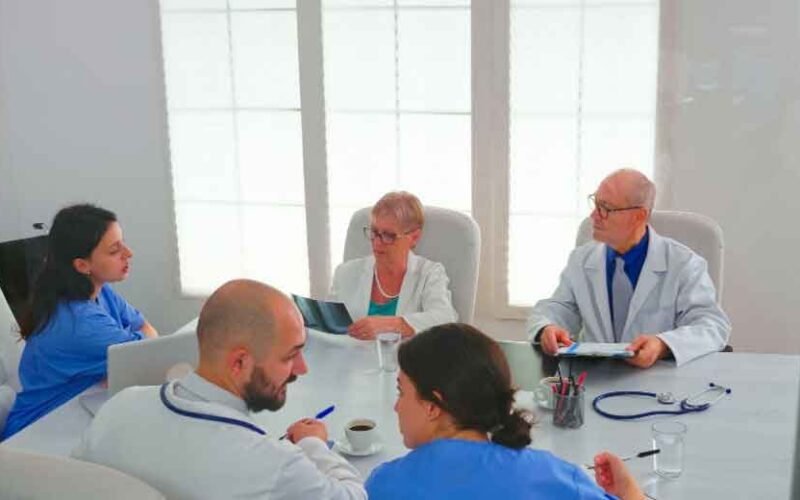When patients face medical emergencies in non-native languages, accurate translation becomes essential because it impacts both their understanding and their survival. Medical errors such as inaccurate diagnoses and unsafe prescriptions can result from translation inaccuracies during patient care.
The complexity of medical terminology combined with language variations requires exact linguistic precision. Through precise translation patients grasp their medical conditions and therapy choices while safeguarding their health results and building trust with their doctors. The delivery of quality care in every medical setting relies upon the provision of precise translation services to facilitate effective communication.
Bridging Language Barriers for Accurate Patient Care
Language differences can create challenges in healthcare. The inability of patients to fully communicate their symptoms because of language barriers creates difficulties in achieving accurate diagnoses. Life science translation plays an essential role in bridging communication gaps to maintain clarity and avoid misunderstandings.
Patient care suffers when misinterpretations cause improper treatments and unnecessary patient stress. Accurate translations allow healthcare professionals to provide suitable treatments that lead to better patient health results. Through collaboration healthcare providers ensure patient needs are both clearly understood and properly managed.
Consequences of Miscommunication in Healthcare
Communication errors within healthcare environments can lead to significant negative outcomes. Translation mistakes lead to improper dosage administration or incorrect health management of patients. Medical errors can lead to serious health problems and might result in dangerous situations that threaten patients’ lives.
The foundation of trust and rapport between patients and healthcare providers rests on effective communication. Both patient safety and trust between patients and healthcare providers suffer when misunderstandings occur. Such communication failures negatively affect patients’ experiences and deter them from seeking essential medical care when needed.
Supporting Informed Consent and Patient Rights
Informed consent serves as a cornerstone for maintaining patient autonomy and protecting their rights. It is essential for patients to understand both their medical conditions and the treatment plans suggested by their healthcare providers. Accurate translation is essential for fully informing patients about their medical situations.
Patients who receive accurate translations of medical data can grasp complex healthcare information which enables them to make knowledgeable healthcare choices. The patient-provider relationship benefits from respect for patient rights which leads to a healthcare experience that is both personalized and respectful.
Improving Outcomes Through Quality Translation Practices
Precise translation accuracy remains essential for ensuring both patient safety outcomes and successful medical treatments. The combination of comprehensive review procedures and cutting-edge translation tools along with healthcare professional partnerships delivers substantial improvements in outcomes.
Implementing Robust Review Processes
Robust review processes play a vital role in securing high-quality medical translations. Your translation process must involve several proofreading stages along with expert validation. Establish a standard practice where native speakers work alongside medical experts to verify translation accuracy and medical correctness.
A checklist for typical mistakes combined with a feedback system creates essential methods for improving translation quality. To remain proactive in medical translation work adopt best practices and guidelines that apply specifically to this field. By following these established protocols medical translations achieve both accurate messaging and exceptional patient care standards.
Leveraging Technology: Translation Tools in Medicine
The development of modern technology has brought numerous translation tools which deliver enhanced precision when used in medical settings. Machine translation that uses specialized medical databases can generate a solid preliminary translation which human experts can then refine. CAT tools provide essential features including terminology management and consistency checks.
Translation memory systems store verified translations of medical terms and phrases to ensure consistent usage across future projects. Medical-specific glossaries and dictionaries provide essential support for achieving precise translations. Using advanced translation technologies together with expert translators yields highly dependable medical translation results.
Collaboration Between Healthcare Professionals and Translators
Effective medical translation requires strong collaboration between healthcare professionals and translators. Open communication between healthcare professionals and translators is necessary to ensure clarity of complex medical terms and cultural differences. Through this collaborative process translations achieve both linguistic precision and contextual appropriateness.
Translators can access ongoing training to remain informed about the latest medical terminology and advancements through regular workshops and training sessions. Organize collaborative sessions between translators and medical professionals to facilitate mutual knowledge sharing. A culture of shared learning and mutual respect among medical translation professionals leads to higher quality translations which results in better patient care outcomes.
Looking Ahead: Future Trends in Medical Translation
The progress of technology promises to make medical translation more accessible and ethically reliable which will enable breakthroughs in delivering high-quality healthcare across different languages and cultures. Medical translation research focuses on remote translation capabilities and ethical standards that guarantee patient protection.
Expanding Access with Remote Translation Services
Remote translation services in healthcare revolutionize patient and professional communication by overcoming language barriers. The growing use of telehealth services now allows patients to access real-time translation support during their virtual medical consultations. Remote translation services provide essential language support for patients in rural or underserved regions where in-person translators are scarce.
AI and machine learning technologies enable remote translation tools to achieve greater accuracy while improving operational efficiency. Medical platforms demonstrate rapid adaptability to specific medical terms which enables exact communication about complicated health concepts. Human supervision is essential to identify subtle meanings or contextual elements that automated systems might overlook.
Accessibility is another critical benefit. Apps and online platforms now provide patients with access to medical translations for easy comprehension of health information at any time. Empowered patients become more knowledgeable about health matters which enables them to take an active role in their healthcare choices.
Ethical Considerations for Patient Safety
Medical translation work needs to address ethical issues because they hold major importance in this field. Protecting patient safety requires more than accurate translation because it demands confidentiality maintenance and culturally respectful information delivery. The serious consequences of misinterpretations establish the importance for translators to recognize the ethical responsibility in their work.
The area of informed consent demands significant attention within medical translation practices. Patients need to completely understand their treatment choices and consequences which demands translators who provide straightforward and impartial information. A standardized ethical framework needs to be established to guide medical translators towards consistent and reliable practices.
Training programs help translators deepen their understanding of ethical issues. These programs train translators to manage medical situations respectfully through cultural sensitivity and ethical standards. The dedication to ethical translation practices leads to improved safety and trust for patients.
Bridging Worlds, Saving Lives: The Power of Precise Translation
Translation in healthcare demands more than linguistic accuracy because it serves as a critical lifeline. Precise communication between healthcare providers and patients enables necessary medical treatments from informed consent through emergency situations without language barriers. Medical and life science translation proves essential through its ability to handle complex terminology and deliver culturally sensitive support. Our dedication to clear communication, ethical practices, and collaborative work needs to grow alongside technological progress and expanding global access. Because in medicine, every word truly matters.










